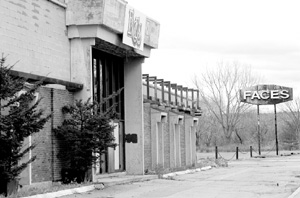Land takings derailed, Faces nightclub goes on decaying

The defunct Faces nightclub on Route 2 was the target of a 2005 eminent domain query that also seems defunct. (Photo: Schuyler Pisha)
The city’s tentative stabs at taking land — to rid Route 2 of the massive, rotting Faces nightclub and build a walkway over railroad tracks near Fresh Pond — are over before they even began, officials said yesterday.
Perhaps inspired by the June U.S. Supreme Court ruling that suggested communities can take private property for the greater public good, the City Council asked city manager Robert Healy to look into eminent domain proceedings. The council intends to take up the issue Monday.
But Healy and a report from city solicitor Donald Drisdell indicate the targets are safe.
Faces, the all-ages club launched in 1963, has been defunct for more than a decade. The building is so dilapidated there’s moss growing on it. The building is literally falling apart, with mortar missing from entire rows of brick in the walls. Electrical conduit, insulation and other assorted rotting building materials are spewing out of every orifice.
Any remaining glass at the site — big enough for a football field — looks like it was sprayed with bullets.
The council did not specify what use it envisioned for the property. Its members apparently needn’t worry: City manager Robert Healy doesn’t support a takeover. “Someone suggested that we use eminent domain,” Healy said yesterday. “But we won’t.”
Instead, he said, “let’s let the private sector take care of it.”
Healy said a developer is interested in the property, which is owned by Martignetti Brothers — the same family that owns the neighboring Cambridge Gateway Inn.
At the other potential takeover site, the Fresh Pond railroad property, officials said that a pedestrian bridge is necessary for safety, and that it’s better to handle the issue now than “whenever someone gets run over by a train.” But Drisdell says the plan to take over land through eminent domain to build the bridge is fraught with “wrinkles.”
For one thing, “taking an easement over land owned by an operational railroad is cumbersome under state and federal law,” Drisdell wrote in his report to the city, “and could lead to a challenge by the railroad if the proposed easement use would seriously interfere with the railroad use.”
Oddly, the city can’t legally take over railroad property unless the railroad agrees to it, in which case the city wouldn’t need to take it over in the first place.
Drisdell also explained to the council that the Supreme Court case — a 5-4 decision called Kelo v. City of New London — did not necessarily put Cambridge and cities across the country in a better position to grab property, no matter how it seemed at the time of the decision.
Cambridge hasn’t used eminent domain in more than 20 years — when the city wanted to make a public park at River Court — and that was a disaster ending in a lawsuit, councilor and former mayor Kenneth Reeves said.
